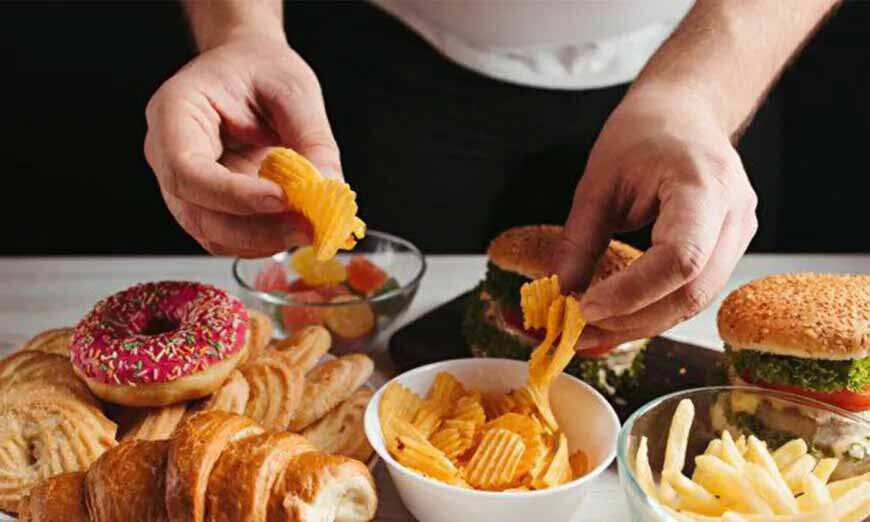
In recent decades, ultra-processed foods (such as fast-food hamburgers, instant noodles, cakes, potato chips, etc.) have entered nearly every household. They taste good and are convenient and affordable. However, research shows that ultra-processed foods may cause serious health problems, and excessive consumption can increase the risk of death.
Excessive Consumption of Ultra-Processed Foods Increases the Risk of Death
Data show up to 71 percent of packaged foods sold in the United States are considered ultra-processed. Although there are differences in education and income levels, the intake of ultra-processed foods is generally high across all socioeconomic levels.
A study published in the British Medical Journal in May 2019 showed that consuming large amounts of ultra-processed foods (more than four servings per day) increases overall mortality by 62 percent. In addition, for every additional serving of ultra-processed food consumed, overall mortality increases by 18 percent. This study followed 19,899 participants (7,786 men and 12,113 women) with an average age of 37.6 years for a median duration of 10.4 years.
The researchers pointed out that this study is observational and cannot establish causality. Unmeasured confounding factors may also influence some observed risks. Nevertheless, these findings support other studies linking ultra-processed foods with adverse health conditions.
The research team stated that policies must be developed to limit the proportion of ultra-processed foods in diets and promote the consumption of unprocessed or minimally processed foods to improve global public health.
Consuming Ultra-Processed Foods Increases the Risk of Cancer
The term “ultra-processed foods” comes from the NOVA food classification system (pdf) developed by researchers at the University of Sao Paulo in Brazil. The system categorizes foods into four groups based on their degree of processing during production:
- Unprocessed or minimally processed foods: Fruits, vegetables, milk, fish, beans, eggs, and nuts that have not had any ingredients added and have undergone minimal changes compared to their natural state
- Processed ingredients: Foods added to other foods and not consumed alone, such as salt, sugar, and oil
- Processed foods: Made from the first two food groups and can be changed in various ways (examples: jams, pickles, canned fruits, homemade bread, cheeses)
- Ultra-processed foods: Usually contain five or more ingredients with a long shelf life and often contain many industrial additives such as preservatives, emulsifiers, sweeteners, and artificial colors and flavors.
A study published in February in the eClinicalMedicine journal showed that consuming large amounts of ultra-processed foods is associated with an increased risk of overall cancer incidence, particularly ovarian and brain cancer. In addition, the study found that high consumption of ultra-processed foods is associated with an increased risk of mortality from cancer, especially ovarian and breast cancer.
The study found that for every 10 percent increase in ultra-processed food intake in the diet, there was a 2 percent increase in overall cancer incidence rates and a 19 percent increase in ovarian cancer incidence rates. For every 10 percent increase in ultra-processed food consumption, there was a 6 percent increase in overall cancer mortality rates, a 16 percent increase in breast cancer mortality rates, and a 30 percent increase in ovarian cancer mortality rates.
This is the most comprehensive assessment of the association between ultra-processed foods and cancer risk to date. Eszter Vamos, the lead senior author of the study from the School of Public Health at Imperial College London, said, “This study adds to a growing body of evidence suggesting that ultra-processed foods may have negative health effects, including an increased risk of cancer.”
Ultra-Processed Foods Linked to Various Diseases
A study published in the authoritative journal JAMA Neurology in December 2022 confirmed that limiting the intake of ultra-processed foods may help reduce cognitive decline in middle-aged and older people.
The research team from the School of Medicine at the University of Sao Paulo in Brazil recruited 10,775 participants aged 35 to 74. It divided them into four groups based on the percentage of ultra-processed foods they consumed as part of their overall diet. The participants were followed up for a median of eight years.
The statistics showed that compared with the group that consumed the least amount of ultra-processed foods, middle-aged people who consumed the most (three-quarters of their diet) experienced a 28 percent faster decline in cognitive ability and a 25 percent faster decline in “executive function,” which is necessary for learning, working, and daily life.
In another study published in May 2019 in the British Medical Journal, researchers from France and Brazil evaluated the association between ultra-processed food intake and cardiovascular disease (CVD) risk, including heart disease and stroke.
They divided 105,159 participants with an average age of 42.7 years (21,912 men and 83,247 women) into groups based on their diets’ food processing level. They also measured disease incidence during a follow-up period of up to 10 years (2009 to 2018).
The results showed that when the absolute proportion of ultra-processed foods in the diet increased by 10 percent, there was a corresponding increase in CVD incidence rates by 12 percent, heart disease by 13 percent, and stroke by 11 percent.
Teen Consumption of Ultra-Processed Foods
The latest evidence suggests that teenagers who consume more ultra-processed foods are likelier to make unhealthy dietary choices than those who consume less. Study results released at the American Heart Association’s Hypertension Scientific Sessions held in September 2022 found a link between poor dietary habits and certain ultra-processed foods, such as pastries, candy, and frozen desserts.
In a two-month experiment, more than 300 teenagers completed a dietary survey detailing their ultra-processed food intake. The results showed an increase in the frequency of frozen dessert consumption, pastry consumption, and candy consumption was associated with an 11 percent, 12 percent, and 31 percent increase in all other ultra-processed food consumption, respectively.
Maria Balhara, the study’s lead researcher and a student at the David Brautman College in Florida, said: “Ultra-processed foods are designed to be very tasty or designed to be as addictive as possible. They are cheap and convenient, making them difficult to resist. Most people eat too much of these foods without realizing it.”
Important Notice: This article was originally published at www.theepochtimes.com by David Chu where all credits are due.
Disclaimer
The watching, interacting, and participation of any kind with anything on this page does not constitute or initiate a doctor-patient relationship with Dr. Farrah™. None of the statements here have been evaluated by the Food and Drug Administration (FDA). The products of Dr. Farrah™ are not intended to diagnose, treat, cure, or prevent any disease. The information being provided should only be considered for education and entertainment purposes only. If you feel that anything you see or hear may be of value to you on this page or on any other medium of any kind associated with, showing, or quoting anything relating to Dr. Farrah™ in any way at any time, you are encouraged to and agree to consult with a licensed healthcare professional in your area to discuss it. If you feel that you’re having a healthcare emergency, seek medical attention immediately. The views expressed here are simply either the views and opinions of Dr. Farrah™ or others appearing and are protected under the first amendment.
Dr. Farrah™ is a highly experienced Licensed Medical Doctor certified in evidence-based clinical nutrition, not some enthusiast, formulator, or medium promoting the wild and unrestrained use of nutrition products for health issues without clinical experience and scientific evidence of therapeutic benefit. Dr. Farrah™ has personally and keenly studied everything she recommends, and more importantly, she’s closely observed the reactions and results in a clinical setting countless times over the course of her career involving the treatment of over 150,000 patients.
Dr. Farrah™ promotes evidence-based natural approaches to health, which means integrating her individual scientific and clinical expertise with the best available external clinical evidence from systematic research. By individual clinical expertise, I refer to the proficiency and judgment that individual clinicians acquire through clinical experience and clinical practice.
Dr. Farrah™ does not make any representation or warranties with respect to the accuracy, applicability, fitness, or completeness of any multimedia content provided. Dr. Farrah™ does not warrant the performance, effectiveness, or applicability of any sites listed, linked, or referenced to, in, or by any multimedia content.
To be clear, the multimedia content is not intended to be a substitute for professional medical advice, diagnosis, or treatment. Always seek the advice of your physician or other qualified health providers with any questions you may have regarding a medical condition. Never disregard professional medical advice or delay in seeking it because of something you have read or seen in any website, video, image, or media of any kind. Dr. Farrah™ hereby disclaims any and all liability to any party for any direct, indirect, implied, punitive, special, incidental, or other consequential damages arising directly or indirectly from any use of the content, which is provided as is, and without warranties.








